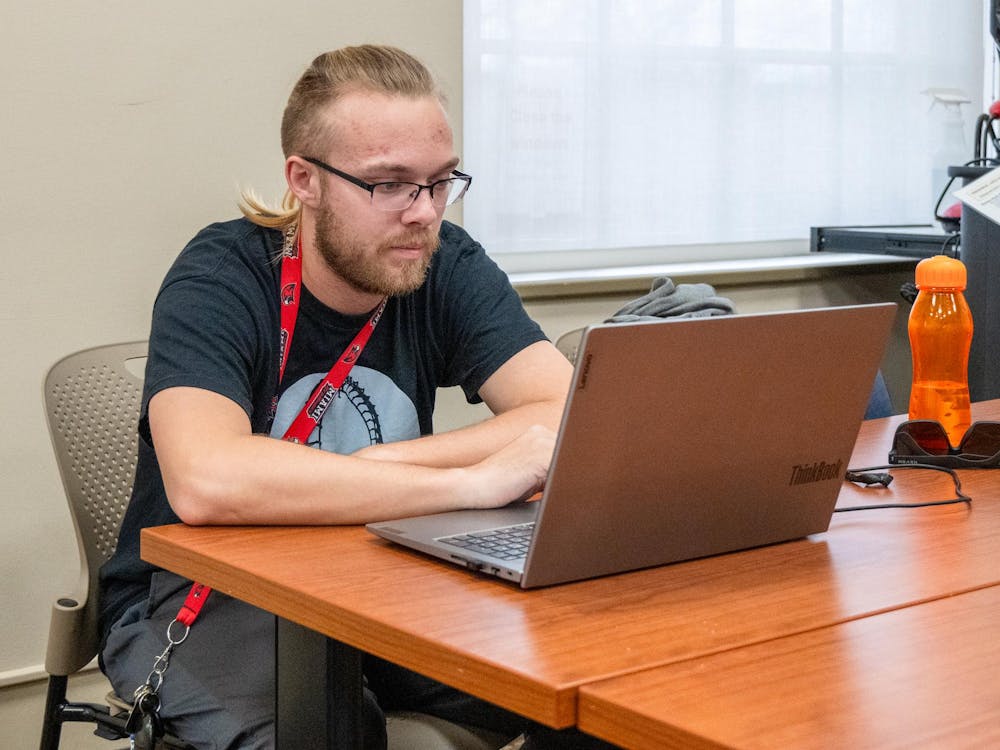AAUP cautions not to ignore problems
By Megan Zahneis, News Editor
Miami University was recently ranked second in the nation for its commitment to undergraduate education by U.S. News and World Report, behind only Princeton University.
The specialty list, compiled by the media conglomerate as part of its annual "Best Colleges" analysis, qualifies Miami as the top public university in the United States. Miami has placed in the top five in each of the past seven years.
Being named to the "Best Undergraduate Teaching" list, university spokesperson Claire Wagner said, is quite the honor.
I don't know if there's anything more significant we can say than [that] an outside source says when you come here, you're going to get attention from faculty," Wagner, Miami's director of university news and communications, said. "That is what you need to be nurtured and to be educated and grow into the best person you can be. That is fabulous to be able to market that."
Though its "Best Undergraduate Teaching" metric is relatively new, U.S. News and World Report has ranked colleges annually since 1983 on factors such as retention and graduation rates, financial resources, class sizes and faculty resources.
"U.S. News and World Report is the gold standard of university rankings," Wagner said. "We're not fooled by the fact that they want to sell magazines, just like Money magazine and Fortune and everybody else who does rankings, but they have had a very solid methodology for years."
That methodology is explained on the U.S. News website as a peer review of sorts. College presidents, provosts and admissions deans who participated in its annual Best Colleges rankings were also asked to identify up to 10 schools specializing in undergraduate education. U.S. News then compiles the survey results in descending order of the number of nominations received. Schools had to receive at least seven nominations to be listed, and this year 20 met that mark.
But while pleased with the recognition, several faculty members involved in Miami's advocacy chapter of the American Association of University Professors were skeptical of the criteria used to determine U.S. News' rankings.
"I'm really glad that Miami is being recognized [for its undergraduate education], because I can feel it among all the faculty that I know," Cathy Wagner, AAUP vice president and professor of English, said. "We're really committed to undergraduate education and I can see that the students value our teaching. I do think we're a really good teaching school with a genuine commitment.
"Whether the statistics are correct is a whole other question because as I understand it, these statistics are very sketchy. They're generated by asking a bunch of university presidents where they think good teaching is. These statistics are not very reliable. What they're a measure of, I'm not sure. They're a measure of reputation."
Enjoy what you're reading?
Signup for our newsletter
Her colleague in the English department, AAUP co-president Keith Tuma, concurred.
"I think we're always happy to be highly rated. We're glad to be recognized. But we're not so naive [as] to imagine that number is the whole picture. What are those ratings really taking into consideration?" Tuma said. "I think they are the product of incentives and repetition as much as anything else."
Tuma added that because Miami has appeared in U.S. News' rankings so consistently, this year's announcement came as no surprise to him.
"We haven't changed," Tuma said. "It's like an alarm clock every year at this time, to hear that we are number two in the nation. That suggests that they're looking at the same limited data set every single year."
And while U.S. News cites Miami's faculty-to-student ratio at 17:1, noting that 31.9% of Miami's courses have 20 students or fewer, for Tuma, those numbers cloak some less positive developments at Miami.
"Those numbers can be an excuse to ignore some of the things that are going on here," Tuma said. "We keep raising the number of students we are admitting, and we aren't hiring enough additional tenure-track faculty [to accommodate that increase]. Most of these students are being taught by adjunct and visiting faculty."
But Claire Wagner said that Miami operates on fewer resources than smaller, more elite schools like Princeton, whose resources per capita tend to be higher than Miami's.
"I think people need to look at a big picture and go, 'Wow, with their resources, with the size of the student body that they're expected to nurture the right way and educate as fully as they can, [Miami is doing a] good job."




